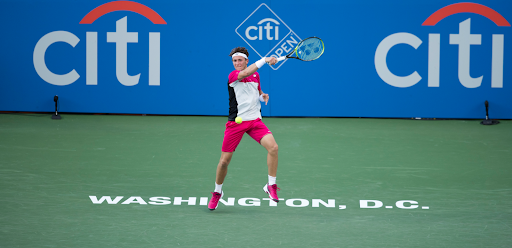Last month, the inaugural Six Kings Slam, a tennis exhibition tournament that took place in Riyadh, Saudi Arabia, offered a staggering $6 million grand prize for the tournament champion—an amount nearly double the total prize money awarded at any of the four major tennis championships (US Open, Wimbledon, Roland Garros, and Australian Open.)
However, certain players such as Norwegian tennis star Casper Ruud have brought up questions surrounding sportswashing, a tactic used to divert public attention from unethical practices through high-profile sporting events. Though he had not been offered a spot at the Six Kings Slam, Ruud revealed to Danish outlet SpilXperten that he had in fact declined several offers to compete in Saudi Arabia in the past.
“It is obviously a controversial country in terms of many things, but there are also other countries that are controversial that we go to and play in,” said Ruud. “You can definitely discuss China and human rights in China, but we go there every year. There was a lot of talk about Peng Shuai and what happened to her, and that’s just to say that if you want to point to Saudi Arabia as a controversial country, you should also mention other countries that we’re not talking about.”
Ruud’s reference to Peng Shuai was a bold move, but not an irrelevant one. In November of 2021, Peng Shuai, Chinese tennis star and former #1 doubles player in the world, took to social media to accuse high-ranking Chinese government official Zhang Gaoli of sexual assault. Not even 30 minutes after the accusation, Shuai’s social media post was wiped off the internet, and Chinese social media platforms began censoring any and all searches related to the incident.
Not only did Shuai’s post disappear, but so did she. For the next three months, Shuai had completely vanished from public view, appearing only once at a public event in Beijing, accompanied by Chinese government officials. Observers noted the controlled nature of her appearance, leading many to question her safety and freedom.
Dozens of other tennis stars, including Serena Williams, Naomi Osaka, and Billie Jean King, spoke up about Peng Shuai’s disappearance, demanding that the WTA (Women’s Tennis Association) take action. In December 2021, Steve Simon, WTA Chairman & CEO, responded via the WTA website with the suspension of all events in China, due to “serious doubts that [Shuai] is free, safe, and not subject to censorship, coercion and intimidation.”
In February 2022, during the Beijing Winter Olympics, Shuai finally made an appearance for an interview with the French magazine L’Équipe and announced her official retirement from professional tennis. In the interview, Shuai denied having made any claims of sexual assault against Gaoli, stating that the Western media had misinterpreted her former comments.
Receiving assurance from Chinese government officials that Shuai was safe and living with family in Beijing, the WTA resumed tournament play in China by September 2023.
As the Six Kings Slam captivates audiences with its lucrative prizes and elite competition, it can also be perceived as a means for Saudi Arabia to improve its global image, thereby overshadowing certain domestic issues, such as its restrictive policies towards women and LGBTQ+ individuals.
Saudi Arabia and China, however, are far from being the only two authoritarian regimes to face criticism for using the prestige of sports to mask their questionable human rights records.
In 1936, three years after Hitler’s rise to power in Germany, the Olympic Games in Berlin sparked nationwide anti-fascism movements due to the Nazi Regime’s exclusion of Jewish athletes from the German Olympic team. The Olympic Games still took place.
Similarly, the Argentinian FIFA World Cup of 1978 faced mass criticism due to Argentina’s military dictatorship led by Videla, who was eventually sentenced to life in prison for his ruthless campaign of political killings and forced disappearances. The World Cup still took place.
More recently, the selection of Qatar as FIFA World Cup host in 2022 was incredibly controversial due to the country’s alleged violation of human rights against migrant workers. The World Cup, once again, still took place.
As sports become a tool for nations to polish their images, athletes must decide whether to engage in this narrative or stand against it. However, any sort of political talk from athletes is frequently shut down immediately.
In the 1968 Mexico City Olympics, medalists Tommie Smith and John Carlos were famously vilified by the media and faced severe backlash after raising their fists in a Black Power salute on their podiums, protesting racial discrimination and human rights violations in the United States.
Just a few months ago at the Paris 2024 Olympic Games, Afghan refugee breakdancer Manizha Talash was disqualified for wearing a cape that read “Free Afghan Women.”
Even Casper Ruud, after speaking up about the controversy of the Six Kings Slam, was immediately pushed back into silence.
“A lot of people have a lot of opinions on anything you say and people have different views,” said Ruud in a post-match press conference, not even a week after his previous comments. “I won’t speak much about politics for a while, I think.”
The reality is that many athletes feel they must tread carefully when addressing contentious topics, understanding that their careers often depend on their ability to maintain a neutral stance.
Thus, significant questions arise about the future of athlete activism. Will we see a new generation of players willing to challenge the status quo, or will the fear of jeopardizing their careers continue to mute their voices? Will the Six Kings Slam be a moment of reflection that leads to change, or merely another example of how sports can be manipulated for political gain?
As athletes step into the arena, they not only represent their countries but also the values they wish to uphold. The challenge ahead is clear: to transform the world of sports into one that champions integrity, fosters dialogue, and ultimately holds those in power accountable.

